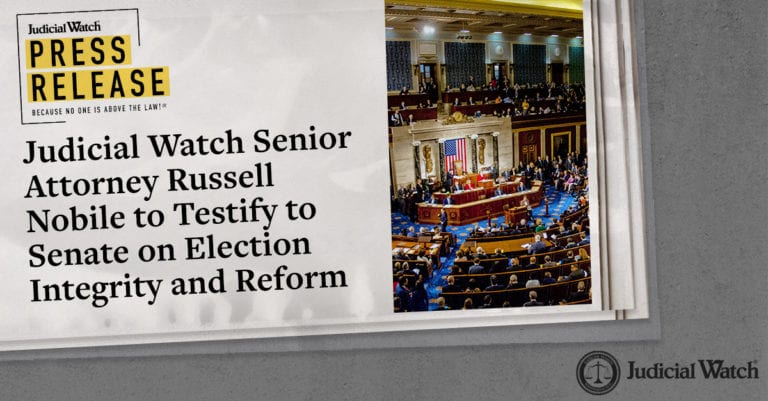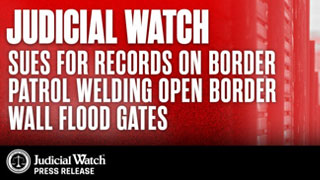

Judicial Watch Senior Attorney Russell Nobile to Testify to Senate on Election Integrity and Reform


(Washington, DC) – Judicial Watch announced today that Senior Attorney T. Russell Nobile will provide testimony tomorrow, July 14, before the U.S. Senate Judiciary Committee’s Subcommittee on the Constitution, during a hearing titled “Restoring the Voting Rights Act after Brnovich and Shelby County.”
Date: Wednesday, July 14, 2021
Time: 2:30 p.m. ET
Location: Dirksen Senate Office Building Room 226
To watch live online, click here:
The purpose of the hearing is to consider whether congressional action is called for in the aftermath of the Supreme Court’s 2013 landmark ruling in Shelby County v. Holder (570 U.S. 529) and its recent ruling in Mark Brnovich, Attorney General of Arizona, et al. v. Democratic National Committee, et al. (Nos. 19-1257 & 1258).
In Shelby, the court rejected forcing states to be under the thumb of the DOJ based upon voting/race data from the 1960s. The court struck down Section 4(b) of the Voting Rights Act of 1965 (VRA), which provided the “coverage formula” that determines which states and local governments are subject to a preclearance requirement under Section 5. Section 4(b) required certain states and local governments to obtain a predetermination by the United States Attorney General or a three-judge panel of the U.S. District Court for the District of Columbia affirming that changes to their voting laws or practices do not “deny or abridge the right to vote on account of race, color, or membership in a language minority group” before those changes could be enforced.
In Brnovich, the court considered two Arizona election policies, one outlawing ballot harvesting and the other banning out-of-precinct voting. The court ruled that neither of these election policies violated the Voting Rights Act nor had a racially discriminatory purpose. Judicial Watch joined with Allied Educational Foundation (AEF) to file an amici curia (friends of the court) brief in this case, arguing that the parties challenging Arizona’s clean election laws “utterly failed” to show that the challenged voting procedure caused minorities to have less opportunity to participate in the political process and to elect representatives of their choice. The court agreed.
Reacting to the court’s ruling in Brnovich, Judicial Watch President Tom Fitton called the court’s decision “a home run for cleaner elections, reaffirming that states may take action to prevent election fraud without waiting for it to occur within their own borders. This new decision rightly rejects the race baiting of the leftist partisans who pretend that neutral provisions to combat voter fraud (such as voter ID and bans on ballot harvesting) are presumptively racist. The decision also destroys the foundation of the Biden administration’s recent attack on Georgia’s election reform laws.”
For more than 25 years, Judicial Watch has been known for its aggressive, leading edge use of public records laws and lawsuits, as well as taxpayer, civil rights and whistleblower protection litigation to fight government corruption. Judicial Watch is a national leader in voting integrity and voting rights. As part of this effort, Judicial Watch assembled a team of highly experienced voting rights attorneys who have fought gerrymandering in Maryland, stopped discriminatory elections in Hawaii, and cleaned up voter rolls in California, Ohio, Indiana, and Kentucky, among other achievements.
In May testimony before the House Judiciary Committee’s Subcommittee on the Constitution, Civil Rights, and Civil Liberties regarding Section 5 of the VRA, Nobile noted:
Section 5 of the VRA was a temporary, extraordinary remedy to address an extraordinary problem. Before its passage, the democratic process in much of the South was failing because of intentional state-sponsored … and/or state- supported efforts to disenfranchise Blacks.
***
At bottom, the central question is [whether] circumstances still necessitate Section 5’s extraordinary remedies to combat “widespread and persistent discrimination in voting.”
***
Data, not pop culture nor hyperbole from those that oppose race-neutral election integrity laws, tells the true story of ballot access in America. To objectively evaluate whether racial minorities have an equal opportunity to participate in the electoral process, you must look at racial registration and turnout data…. Current data show that black registration has completely rebounded and, in some instances, exceeds white registration rates. In fact, the data show that eight years after Shelby County, registration disparities in Texas, Florida, North Carolina, Louisiana, and Mississippi – all previously covered (in whole or part) by Section 5 – are all below the national average. In fact, Black registration in Mississippi is 4.3% higher than White registration.
***
Though it purports to remedy the problems highlighted by the Supreme Court in Shelby County, the truth is that H.R. 4 goes far beyond any civil rights law enacted during the height of the civil rights era. Rather, it is part of a grander plan to shift control of American elections away from individual state legislatures and into the hands of a single federal bureaucratic department. It accomplishes this by giving the Attorney General a previously unseen level of authority over elections. Even more troubling than this change to our constitutional tradition of leaving elections to the states, H.R. 4 will ultimately lead to lasting damage to the Department of Justice’s credibility.
T. Russell Nobile joined Judicial Watch’s legal team as a senior attorney in May 2019. Nobile has appeared before congressional committees and federal courts across the country. He has a wealth of experience developing, analyzing and presenting investigative findings involving difficult and sensitive questions of state and federal law. Nobile previously served for seven years as a trial attorney for the United States Department of Justice, where he brought complex enforcement actions involving the Voting Rights Act of 1965, Civil Rights Act of 1964, Help America Vote Act, National Voter Registration Act, The Violent Crime Control and Law Enforcement Act of 1994, and other federal laws.
###














